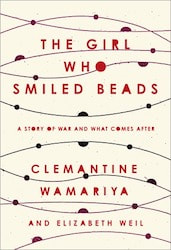
My introduction to the Rwandan genocide of the mid 1990s was the now-famous film Hotel Rwanda. But since learning the story, I’ve read a handful of memoirs about the Rwandan genocide.
The Girl Who Smiled Beads is the latest one I’ve read, but unfortunately, I didn’t find the book very compelling. (You can see my BookTube video response to this memoir here.)
First of all, I want to separate Clementine’s experience from her memoir. Her experience was horrific and I don’t mean to be critical of her survivor’s experience in any way. But there are two problems I have with the memoir itself.
Clementine and her older sister Claire became refugees when first their mother, then their grandmother sent them on the run to escape the slaughter. Their odyssey over the next seven years took them through a number of countries and many refugee camps before they finally end up in the United States, and are ultimately reunited with their family.
Wamariya’s structure alternates chapters from the odyssey in Africa and her time in the United States afterward. But the effect of the fractured chronology is to make it more difficult for the reader to keep the whole context of her experience in mind. I would have been much more focused on the whole story with a straight-forward chronological memoir.
I was also put off by Clementine’s voice throughout the memoir. As her mother reminds her, they were among the lucky families. No one in their family was killed and ultimately they were reunited. But Clementine dismisses her mother’s viewpoint, and her sister Claire’s, who had a much more difficult experience even than did Clementine. Claire, as a young teenager, essentially became Clementine’s parent, providing for her, protecting her from abuse in the camps, guiding her to the safest conditions they could find. In the process, Claire marries a man in one of the refugee camps who proves violently abusive and because they have young children and no resources, Claire can’t really escape him. Yet when they get to America, Claire is determined to get on with her new life and Clementine can’t forgive her for not continuing to see everything through the lens of victimhood.
So while her story is heartbreaking, Clementine’s memoir is disappointing.
The Girl Who Smiled Beads is the latest one I’ve read, but unfortunately, I didn’t find the book very compelling. (You can see my BookTube video response to this memoir here.)
First of all, I want to separate Clementine’s experience from her memoir. Her experience was horrific and I don’t mean to be critical of her survivor’s experience in any way. But there are two problems I have with the memoir itself.
Clementine and her older sister Claire became refugees when first their mother, then their grandmother sent them on the run to escape the slaughter. Their odyssey over the next seven years took them through a number of countries and many refugee camps before they finally end up in the United States, and are ultimately reunited with their family.
Wamariya’s structure alternates chapters from the odyssey in Africa and her time in the United States afterward. But the effect of the fractured chronology is to make it more difficult for the reader to keep the whole context of her experience in mind. I would have been much more focused on the whole story with a straight-forward chronological memoir.
I was also put off by Clementine’s voice throughout the memoir. As her mother reminds her, they were among the lucky families. No one in their family was killed and ultimately they were reunited. But Clementine dismisses her mother’s viewpoint, and her sister Claire’s, who had a much more difficult experience even than did Clementine. Claire, as a young teenager, essentially became Clementine’s parent, providing for her, protecting her from abuse in the camps, guiding her to the safest conditions they could find. In the process, Claire marries a man in one of the refugee camps who proves violently abusive and because they have young children and no resources, Claire can’t really escape him. Yet when they get to America, Claire is determined to get on with her new life and Clementine can’t forgive her for not continuing to see everything through the lens of victimhood.
So while her story is heartbreaking, Clementine’s memoir is disappointing.
 RSS Feed
RSS Feed
